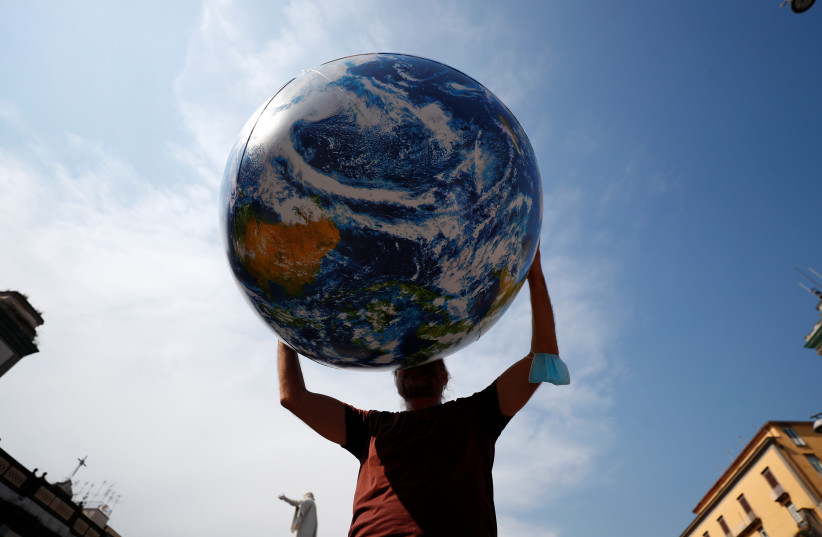In a world falling apart at the seams, the international community is looking desperately for new social and economic models, for success stories that can be adapted and replicated in various places. My position is that we need a Big Shift, one that will change the social, economic and political mechanism that triggers the destruction of the status quo and removes vast economic and financial inefficiencies.
Urbanization, globalization, specialization and rapid economic growth have been possible due to increased flows of energy that were spectacularly cheap in both monetary and energy terms. The growth of complex global systems – industrialized agriculture, commerce, manufacturing, transport and finance – was mostly subsidized by the availability of inexpensive and abundant carbon that underpinned all technological advances.
It is painfully clear now that the global industrial and financial system has reached scales and levels of hyper-complexity that are no longer viable in a world of expensive energy, resource scarcity and environmental destruction.
Right now, two economies are fighting to the death. One is a highly capitalized, bureaucratically ossified having high-overhead and unsustainable economy. It is the subsidized and protected product of the collusion between Big Government and Big Business. The other is a low-capital, low-overhead, resilient and sustainable distributism-oriented economy. It is outperforming today’s international economy despite being marginalized and discredited by mainstream thinking. The alternative economy is developing within the interstices of the old one, preparing to supplant it.
In my view, sustainability is a matter of scale and resilience. In order to respond to lower energy flows, humanity needs to simplify the social, political and economic systems as a way to inflict less damage on the Earth and the climate and to live within a lower energy budget. We need smaller economies in terms of volume of production, but finer economies of things done better and with more care.
Economies need to be much more local and regional; the economic model of cheap goods made in Asia to be sold in the Walmarts of America is already anachronistic.
In order to adapt to the new reality of sustained contraction, we need to deliberately downscale and simplify our hypercomplex systems. This involves the size of enterprise, both private and public, the length of supply chains and distribution webs, the amount of capital expenditure and the complexity of organization.
We need to grow our food differently as industrial agribusiness is based on cheap oil. We need to do commerce differently, as the Walmart model unravels. We have to rethink transportation, as car-dependency becomes more and more unsustainable.
THE ULTIMATE aim is to live a healthy life in a renewed commonwealth. Health in soil, water and air, health in plant and animal, health in humankind – all of these issues need to be treated as though they are interconnected.
Today’s economy has achieved levels of size and complexity that cannot be supported by the energy and capital formation realities of the future. The engine of job creation will be small and medium enterprises. Therefore, we need to encourage a big shift of the economy from large-scale, conventional production to dispersed production in many smaller businesses.
For example, we need to invest in a version of small-scale organic agriculture that applies the latest findings of biological science to replace a heavily subsidized, heavily polluting agriculture. Organic agriculture could potentially provide enough food globally and a lot more employment, but without the negative environmental impact of industrialized agriculture.
Distributism is the term that best describes the new economy for a renewed commonwealth. It is an economic model in which a more independent workforce, distributed over many smaller businesses, has the resilient qualities of grass. Distributism supports the vision of widespread property ownership as a viable alternative to big, impersonal and ultimately tyrannical social and economic organizations.
One of the greatest virtues of the distributist economy is its superior efficiency in using limited resources intensively, as opposed to the practice of the mass-production industry of adding subsidized inputs extensively. The distributist economy reduces waste and inefficiency through the greater efficiency with which it extracts use-value from a given amount of land or capital.
The distributist economy is essentially a sharing system. When individuals realize that they are involved in a genuine sharing system, an enormous human energy is released: there is a transformation from suspicion to trust; from lack of commitment to strong commitment; from holding back to plunging in; from disappointed wariness to confident hope. Distributism protects the dignity of man in the service of nature and God.
Employee ownership (labor-owned capital), a primary component of the distributist economy, lowers the gap between rich and poor not by taxation (which is painful and can be reversed by the next administration), but by a more even distribution of wealth in the course of creating it. In the very process of creating wealth, employee-owned companies distribute wealth more evenly. This is a sustainable, long-lasting process.
We need not reinvent the wheel. All of Europe was mostly a society of small farms and small shops until about 1950 – and this society has not vanished entirely. In Romania, for example, an excellent basis for distributism already exists, as this country still possesses a great measure of well-distributed rural property. Let us remember what Thomas Jefferson said: “A community of small farmers... land property owners, will be the only assurance that the freedom our republic offers will be guaranteed to each and every citizen.”
If the coming Big Shift will still only center upon the maximization of exchange value measured by money, the fate of the planet is doomed. If, however, we dedicate ourselves to a person-above-profit social and economic vision, to a style of life that resists the waste-making and “disposable” trends in modern, consumerist culture, our children and our planet might still have a chance.
The writer is a Romanian expert in sustainable development, a former senior fellow with the UN Development Program and a former UN special rapporteur. He acquired vast experience in the area of sustainability and hands-on field experience by working with stakeholders in the public and private sectors as well as with the civil society.

